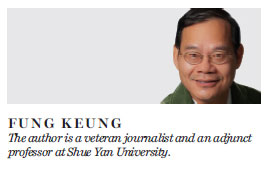Crime wave shows folly of open-door policy to refugees
Updated: 2015-10-07 08:39
By Fung Keung(HK Edition)
|
|||||||||
On Oct 2, two men, both asylum seekers from South Asia, were charged over a high-profile knife attack in Hong Kong's Jordan MTR subway station during the evening rush hour late in September. The incident on Sept 21 left three men in hospital. Police believe the attack was provoked by a long-standing dispute between two gangs.
This case has drawn the public's attention because the attack was on an MTR (subway) platform. Many Hong Kong people take the MTR to work or shop. Indeed, this is only the tip of the iceberg. Government figures show that over the past three years the number of arrested asylum seekers has jumped 33 percent from 683 to 904. In the past, asylum seekers were often arrested for working illegally. However, the latest arrests have been mainly for crimes such as theft, assault or drug-trafficking.
Many victims of asylum seekers' crimes are believed to be Hong Kong citizens. Hong Kong does not deserve this. We should close our doors to asylum seekers. Hong Kong people deserve to live in a peaceful environment without fear or pain.
It is obvious that these so-called asylum seekers are mainly "economic migrants" who want to seek better lives in Hong Kong. About 90 percent of 10,260 asylum seekers, government figures indicate, came from South Asian and Southeast Asian countries including the Philippines and Indonesia. Common sense tells us that religious and political persecution in these countries is extremely rare.
We should learn from our neighbor Singapore, which has a closed-door policy to so-called asylum seekers. Compared to Hong Kong, Singapore is safer and cleaner.
Some economic migrants are believed to borrow from people-smugglers huge sums of money to arrange to travel to Hong Kong and seek refugee status. In order to repay the debts, they have no choice but to commit crimes. (Asylum seekers are banned from working. They receive monthly subsidies to pay for rent, utilities, food and travel. The money is not enough for them to repay their debts.) Hong Kong people have been nice to the asylum seekers. But we should not become victims of their heinous crimes such as knife attacks.
Father John Wotherspoon, a Catholic priest and prison chaplain who has been visiting inmates and detainees in Hong Kong for many years, has noticed a worrying trend of more asylum seekers serving time for serious drug- or violence-related crimes. In previous years, asylum seekers' jail terms were imposed mainly for illegal employment, he said.
A local newspaper quoted Father Wotherspoon as recommending that the problem can be alleviated by a threefold approach. First, Hong Kong can give asylum seekers money (to repay debts) and repatriate them to their home countries. Second, we should try hard to find countries that will accept them as refugees. Third, for those who can speak Chinese we can integrate them into our society.
The first two approaches might work. But the third solution - allowing asylum seekers to work - is a bad idea because it might encourage more economic migrants to come here. Hong Kong's relatively high salaries compared to those elsewhere can be a magnet for potential economic migrants.
So far, Hong Kong's generosity already has encouraged many economic migrants to come our way. The number of asylum seekers, Hong Kong government figures show, has doubled to 10,260 in the past three years - with 60 percent of them coming from India, Vietnam and Pakistan. This trend is alarming. The surge must be halted.
Our government should revisit this open-door policy which has brought citizens nothing but fear and pain. It is time we closed our doors to potential asylum seekers. We owe them nothing. It is better late than never. We deserve to live in peace.

(HK Edition 10/07/2015 page6)